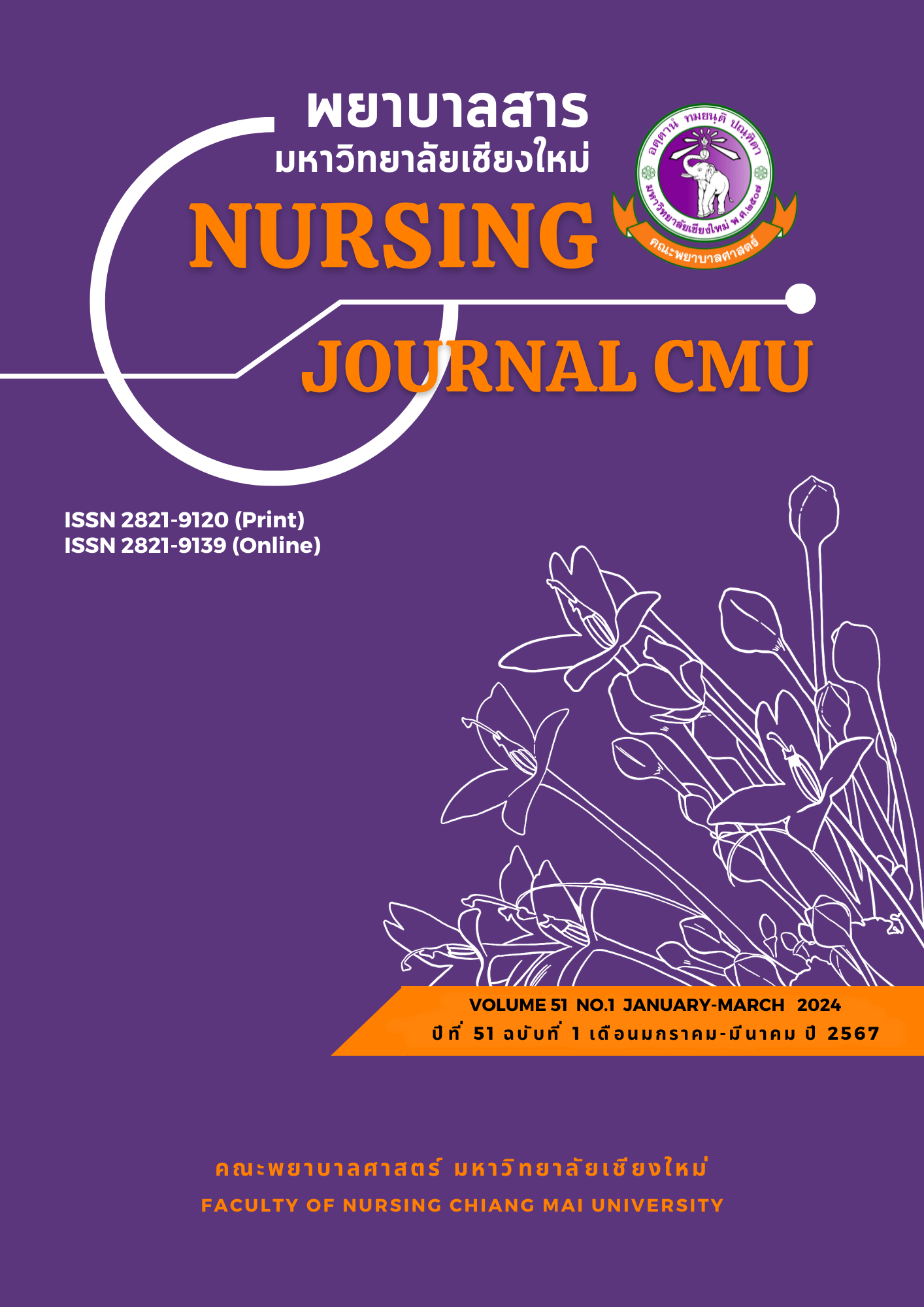Effects of an Educational Program to Enhance Health Literacy on Sexually Transmitted Disease Prevention Behaviors Among 7th-grade Student Leaders in a High School in Savannakhet Province, LAO PDR
Keywords:
Educational programs, Health literacy, Preventive behaviors, Sexually transmitted infections, High school student leadersAbstract
Sexually transmitted infections among high school students in Laos continue to present a health issue for this group. Therefore, promoting behaviors to prevent them is of great importance. This quasi-experimental research using a two-group pretest–posttest design aimed to study the effects of an educational program to enhance health literacy on sexually transmitted disease prevention behaviors among 7th-grade student leaders in a high school in Savannakhet Province, LAO PDR. The sample group consisted of 126 high school student leaders (Grade 7) divided into an experimental group and a comparison group of 63 people each for a period of 6 weeks. The tools used in the study had two parts. Part 1 was a program to promote health literacy towards sexually transmitted infection prevention behaviors using a teaching model based on the Medagogy theory using PITS teaching principles. Part 2 was the data collection form, which consisted of a behavioral questionnaire for prevention of sexually transmitted infections. Cronbach's alpha coefficient was checked for reliability at .92. Data analysis used descriptive statistics, independent t-test, and paired t-test.
After undergoing the educational program to promote health literacy, the experimental group had a significantly higher mean score (M = 93.11, SD = 18.94) for sexually transmitted infection prevention behaviors than before (M = 65.13, SD = 15.79) receiving the program (p < .001) and their behavior in preventing sexually transmitted infections after the experiment was significantly higher than that of the comparison group (M = 78.32, SD = 16.45) (p < .001).
The study revealed that the educational program can enhance health literacy on sexually transmitted disease prevention behaviors among high school student leaders, and therefore, it could be applied to groups of students in other areas with similar contexts.
References
Bureau of Reproductive Health, Department of Health, Ministry of Public Health. (2018). Situation of reproductive health in teenagers and youth. http://rh.anamai.moph.go.th/download/all_file/index/situationRH_2561_Website.pdf
Burns, N., & Grove, S. K. (2009). The practice of nursing research: Appraisal, synthesis and generation of evidence (6th ed.). Elsevier.
Chananok, J., Udompoka, T., & Norkaew, J. (2019). The effect of AIDS prevention behavior promotion program sexually transmitted diseases and pregnancy in school among student leaders in a private school in Mueang District, Nakhon Ratchasima Province. Journal of Health and Development Nakhon Ratchasima Public Health Provincial Office, 5(1), 97-104.
Chanthamath, S., Wongkongdech, R., & Intarat, N. (2019). Behavioral intervention for HIV/AIDS prevention program among students in Khammouane Technical- Vocational College, Lao people’s democratic republic. UBRU Journal for Public Health Research, 7(2), 174-184. https://he02.tci-thaijo.org/index.php/ubruphjou/article/view/171109
Department of Disease Control, Ministry of Public Health. (2023). Annual report 2022 division of AIDS and STLs . https://ddc.moph.go.th/das/journal_detail.php?publish=14849
Inthavong, K., Ha, L. T. H., Anh, L. T. K., & Sychareun, V. (2020). Knowledge of safe sex and sexually transmitted infections among high school students, Vientiane Prefecture, Lao PDR. Global Health Action, 13(suppl 2), 1785159. https://doi.org/10.1080/16549716.2020.1785159
Manwong, M., Thongnopakun, S., Rodjarkpai, Y., Wattanaburanon, A., & Visanuyothin, S. (2022). Sexual health literacy and preventive behaviors among middle-school students in a rural area during the COVID-19 situation: A mixed methods study. Health Promotion Perspectives Journal, 12(2), 178-185.
Nakkling, Y., & Tudsri, P. (2017). Effect of self–efficacy enhancement program on health behaviors among older adults with uncontrolled hypertension. Apheit Journal, 6(1), 27-35. https://apheit.bu.ac.th/jounal/science-vol6-1/3_07_formatted%20V6-1.pdf
Nutbeam, D. (2015). Defining, measuring and improving health literacy. Health Evaluation and Promotion, 42(4), 450–456.
Sookrak, N., Srisuriyawate, R., & Homsin, P. (2018). Predicted factors of consistent condom use among men who have sex with men (MSM) undergraduate students in higher education institutions Chonburi Province. Journal of Public Health Nursing, 32(3), 83-100.
Srimeechai, J., Rutchanagul, P., & Kummabutr, J. (2018). The sexual and reproductive healthcare behavior of university students engaging in virtual marital relationships. Journal of Health and Nursing Research (Journal of Boromarajonani College of Nursing, Bangkok), 34(3), 43-54. https://he01.tci-thaijo.org/index.php/bcnbangkok/article/view/168622
UNFPA. (2023). Bright future in 2023 for Lao PDR and UNFPA cooperation 2022. https://lao.unfpa.org/en/news/bright-future-2023-lao-pdr-and-unfpa-cooperation
Vongxay, V., Albers, F., Thongmixay, S., Thongsombath, M., Broerse, J. E. W., Sychareun, V., & Essink, D. R. (2019). Sexual and reproductive health literacy of school adolescents in Lao. PLOS ONE, 14(1), e0209675. https://doi.org/10.1371/journal.pone.0209675
World Health Organization. (2018). Guidance on ethical considerations in planning and reviewing research studies on sexual and reproductive health in adolescents. https://www.who.int/publications/i/item/9789241508414
World Health Organization. (2019). World Health statistics overview 2019: Monitoring health for the SDGs, sustainable development goals. WHO. https://reliefweb.int/report/world/world-health-statistics-2019-monitoring-health-sdgs
World Health Organization. (2021). Sexually transmitted infections (STIs). https://www.who.int/news-room/fact-sheets/detail/sexually-transmitted-infections-(stis)
Downloads
Published
How to Cite
Issue
Section
License
Copyright (c) 2024 Nursing Journal CMU

This work is licensed under a Creative Commons Attribution-NonCommercial-NoDerivatives 4.0 International License.
บทความที่ได้รับการตีพิมพ์เป็นลิขสิทธิ์ของวารสารพยาบาลสาร
ข้อความที่ปรากฏในบทความแต่ละเรื่องในวารสารวิชาการเล่มนี้เป็นความคิดเห็นส่วนตัวของผู้เขียนแต่ละท่านไม่เกี่ยวข้องกับมหาวิทยาลัยเชียงใหม่ และคณาจารย์ท่านอื่นๆในมหาวิทยาลัยฯ แต่อย่างใด ความรับผิดชอบองค์ประกอบทั้งหมดของบทความแต่ละเรื่องเป็นของผู้เขียนแต่ละท่าน หากมีความผิดพลาดใด ๆ ผู้เขียนแต่ละท่านจะรับผิดชอบบทความของตนเองแต่ผู้เดียว






